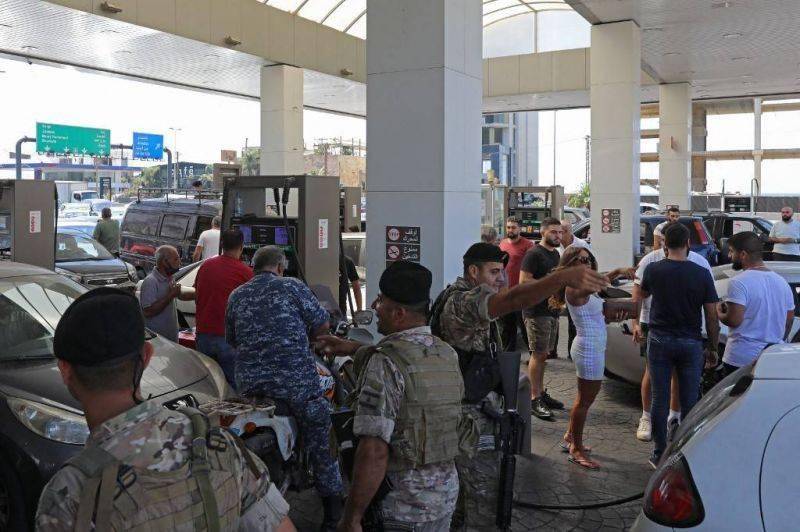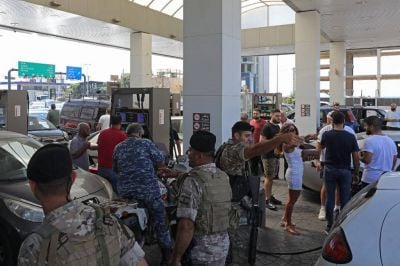
Soldiers deployed to a Beirut gas station on Aug. 14, 2021, after ordering it to reopen. (Credit: Anwar Amro/AFP)
Lebanon has been grappling with an unprecedented fuel crisis for months, causing a devastating domino effect that has impacted all sectors of the economy.
On Aug. 14, just hours before the deadly fuel tanker explosion in Akkar, the Lebanese Army announced in a statement that it was going to force some shuttered gas stations to open and distribute fuel to desperate motorists who had been waiting for hours in huge lines that had been forming outside the stations.
Soldiers were deployed and could be seen helping customers in a number of stations fill up their tanks in a bid to ease the congestion.
The next day, following the tanker explosion in Tleil, the Higher Defense Council, chaired by President Michel Aoun, officially tasked the security forces and the army with “monitoring” the distribution of fuel in the country for a one-month period.
The army’s new mission, however, has not been an easy ride so far.
In some areas, notably in the north and the Bekaa Valley, the army and security forces had to confront some residents who had been hijacking fuel tankers, forcing them to unload at certain gas stations.
Last Thursday, in an impressive scene, a convoy of military Humvees managed to secure a supply of fuel to Akkar.
The army’s mission is all the more complicated amid an acute fuel crisis and recurring violent incidents at gas stations, which have at times degenerated into armed violence that has left people injured and sometimes even dead.
Besides securing supply points, the army has raided some gas stations and seized petrol that was stored illegally to be sold at higher prices on the black market or smuggled across the border to Syria.
To this end, the army has set up a hotline, 112, allowing residents to report illegal fuel stocks — a first since the start of the crisis.
These actions against the networks of hoarders and traffickers, some of whom are affiliated with political figures, marks an evolution in the army’s “mission,” at a time when the military establishment is threatened by the impacts of the crisis, notably the brutal devaluation of the national currency and the collapse of the state more generally, which deeply affects the army’s budget and the soldiers’ pay.
Communication at the heart of the system
Since the army’s announcement on Aug. 14, several stockpiles of gasoline and diesel have been seized.
On the first day of the operation, the army tweeted nearly 20 times, systematically announcing each confiscation.
According to an army veteran who wished to remain anonymous, “the army is trying to respond to a tragic situation in which the political class has proved to be completely ineffective.”
“The deployment of the army shows that this crisis is as serious as a war, with the same devastating effects,” the retired army officer said.
In one of the most significant operations in the new campaign, the army seized stocks of fuel belonging to the Sakr gas station.
The troops raided an agricultural field in the Zahle area, where they discovered around 1.5 million liters of gasoline divided into 38 tanks buried underground.
The army distributed the confiscated petrol to hospitals, bakeries and other essential services. Ibrahim Sakr and his brother, the owners of the gas station, both of whom are close to the Lebanese Forces, were arrested and then released by the Internal Security Forces on the orders of a judge on Aug. 24.
In a statement, the LF said it did not provide any political cover for the Sakr brothers and that the political party was ready to cooperate with the courts for the purposes of the investigation.
Moreover, on Aug. 15, the army announced that it had seized more than 300,000 liters of fuel and diesel in tanks buried behind a house in Nabi Osman, in the Ras Baalbek area in the Bekaa, near the border with Syria.
Relegated primarily to an internal security function and called upon on in all law enforcement operations, the army has seen its popularity undermined by the economic and political crisis.
The troops were constantly charged with protecting institutions from rioters, dispersing demonstrators from main roads and attacking the protesters holding sit-ins around the Parliament building. Today, the army has somewhat managed to restore its image by trying to fight fuel hoarding.
While the army is legally authorized to carry out raids on gas stations as part of its prerogative to take action when the country’s security is undermined, it is not within its remit to distribute the confiscated fuel without the prior agreement of a judge or prosecutor, says retired army Gen. Khalil Helou.
“It is illegal to distribute the confiscated fuel for free to the citizens without the approval of the judicial authority,” Helou says.
But in the eyes of the people, who would denounce such an action at a time when the whole country is left to its own devices amid crippling fuel shortages and when even hospitals are sounding the alarm about the catastrophic situation?
Porous borders
However, one such distribution led to the explosion in Akkar, a blow to the army, which lost 11 soldiers among the more than 30 people killed in the blast.
The army had received a tip from local people about illegal fuel stocks. The troops were still at the site, distributing some the confiscated fuel for free to the people when the explosion occurred.
The owner of the land where the fuel was stocked and the alleged fuel trafficker were arrested and handed over to the judicial authorities, and were charged in the case, along with the person who allegedly sparked the explosion with a lighter. This, however, remains an exception.
“The army is doing a good job of fighting fuel smuggling, but it’s not enough,” Gen. Helou said.
“Those hoarding and smuggling gasoline and diesel do not appear concerned by the law. They should be put under administrative detention and systematically handed over to the police so that the prosecutor can investigate the cases,” he added.
But the army’s balancing act is necessary to preserve security and prevent smuggling operations, while avoiding triggering open conflicts with political parties and militias.
“Who is preventing the army from controlling the border?” Helou asked. “This is a real scandal, and I would like to ask the army chief about it.”
He added, “Smuggling to Syria must stop immediately.”
Most of the passages used by smugglers are well known. The army has four regiments to guard the border, one in each area, with well-defined control missions.
Since a series of car bombs entered and exploded in Beirut between 2013 and 2014 and the desolate areas on the outskirts of the town of Arsal in the Baalbek-Hermel governorate fell into the hands of al-Nusra Front in 2014, the United Kingdom and other partner countries have boosted the Lebanese army’s capacities to control its land border.
However, it is not only the responsibility of the army to control the border, but also of the ISF, customs, General Security and State Security, none of which seem to be effectively fighting against the scourge of smuggling.
This article was originally published in French in L’Orient-Le Jour. Translation by Sahar Ghoussoub.
